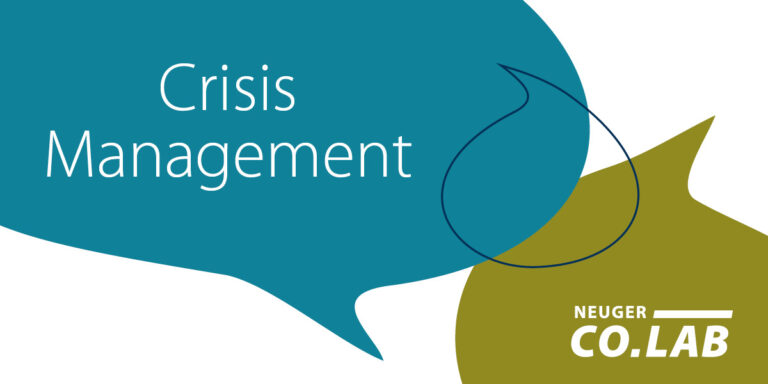
On August 5, 2020, we continued our Neuger CO.LAB session schedule with about 20 participants, this time discussing the topic of crisis communications and how you can turn a potential catastrophe into an opportunity for growth.
Session Eight Hosts
- Christine Lekatz, Vice President & Senior Communications Counselor
- Dave Neuger, President & CEO
Key Discussion Points
- Get the bad news out and get it all out right away. If you try to reveal the crisis gradually, it may look like you’re trying to hide critical information. You want to present it as soon as possible so you can control the media narrative.
- The most important step in crisis communication is caring about the people who are most affected and hurt by the crisis. Ignore the outside factors of how much it could cost your company financially or what it could do to your reputation. Many companies do not want to do business with a company that does not put people first.
- Create an intricate plan of how to manage the crisis once it is out and stick to it.
- Always take into consideration the court of law and the court of public opinion. Employ a skilled team of communicators and attorneys who understand the importance of balancing both. You want trustworthy people to represent your organization when answering questions and dealing with concerns of the general public.
- When handled correctly, a crisis can be a great opportunity for a company’s learning and growth because it can improve reputation and build loyalty with customers.
- CEOs, attorneys, communications teams (can be external) and operational leadership are crucial roles to include in creating and implementing a crisis management strategy.
- Scenario planning is always smart to practice because if another large company within your field has a major crisis, you want to be prepared for experiencing that same crisis. Learn from other companies’ mistakes.
- Be mindful of cultural norms and practices, and make sure you are not misrepresenting race or religious values.
Discussion Questions
Q: How do you identify what a crisis is within an organization?
This is the most challenging part of crisis management. It is crucial to have an extensive internal review to determine if the crisis is severe enough to attract unwanted external attention. It is better to be safe than sorry, meaning that if you are having a difficult time determining the next step, it is probably in your best interest to go public. Having that trusted media source is key in this process because they can often gauge whether or not the issue is or isn’t a crisis based on their reaction. Be vigilant because – if something is handled poorly internally – a small issue can quickly become a significant crisis.
Q: When do you loop in and inform the media?
You never want to be backtracking with information about the crisis. Always break the story so you can control the media narrative and erase any potential for misinformation. If you have an established media source whom you trust, it is often a good idea to have them in on the story early so you can have that external source legitimize your actions towards solving the crisis. If you include close media early on, they will often present your organization in a good light.
Q: If you are an outside agency, how do you ensure that a client is being forthcoming and honest about all the information regarding a recent crisis before partnering with them?
A lot of this process relies on instinct and experience. If you’re skeptical about the authenticity of a company, it’s best to stay away from potential business. Stay rooted in your values, and don’t be hesitant to back out of a partnership if there’s a disconnect between you and the company. Don’t conform to others’ values for financial gain.
In Summary
News can spread like wildfire. Within a matter of hours, a crisis can be uncovered and displayed for all the media world to see, which is essential to remember in planning your organization’s approach to resolution. Be fast in your response, be accurate, and, most importantly, be human.